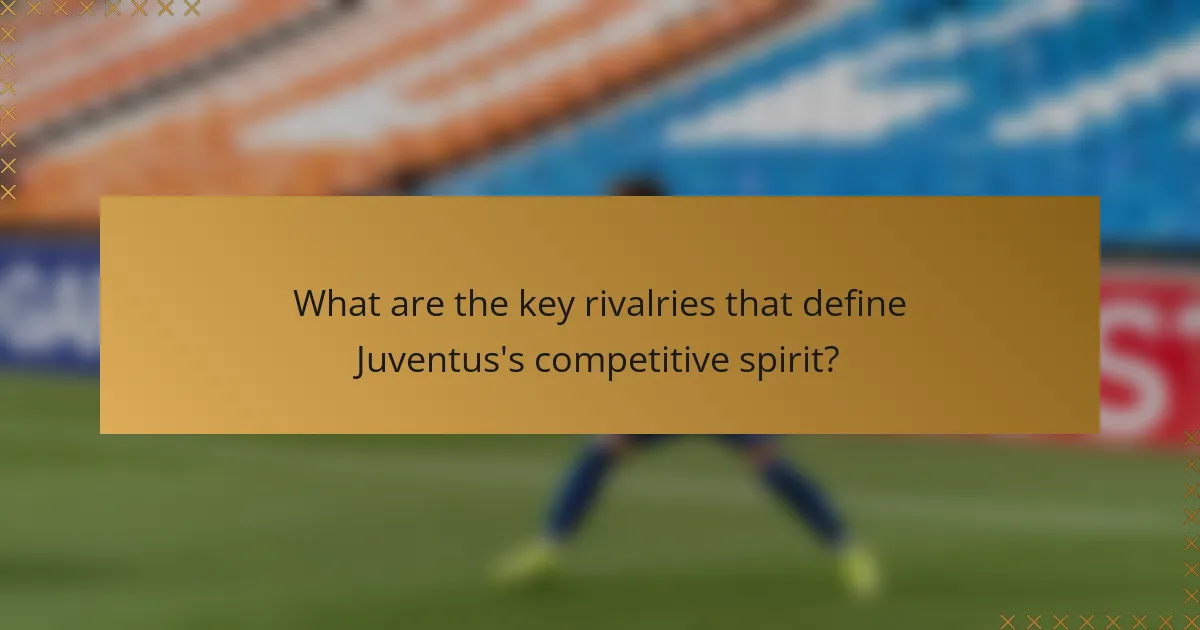Juventus is a cornerstone of Italian football, known for its rich history, tactical innovations, and fierce rivalries. The club’s historical milestones shaped its identity, while its tactical strategies emphasise defensive solidity and counter-attacks. Key rivalries with AC Milan, Inter Milan, and Napoli intensify competition and enhance Juventus’s legacy in the sport. Understanding these elements reveals the depth of Juventus’s impact on football.

What are the historical milestones that shaped Juventus?
Juventus has experienced several historical milestones that significantly shaped its identity and legacy. Founded in 1897, Juventus quickly established itself as a dominant force in Italian football. The club’s first major achievement came in 1905 when they won their first Italian championship.
In the 1920s, Juventus solidified its reputation by winning multiple league titles, showcasing tactical innovations that set trends in Italian football. The 1930s marked a golden era with three consecutive championships from 1931 to 1933.
The post-war period saw Juventus adopting a more defensive style, leading to the famous catenaccio tactic. The club’s success continued into the 1970s and 1980s, highlighted by winning the UEFA Champions League in 1985.
In recent decades, Juventus faced challenges, including the Calciopoli scandal in 2006, which resulted in the club being stripped of titles. However, Juventus rebounded by implementing strategic changes and focusing on youth development, reclaiming its status as a powerhouse in Italian and European football.
How did Juventus evolve through different football eras?
Juventus has evolved through different football eras by adapting its tactical strategies and responding to changing competition. The club’s historical impact is marked by its dominance in Serie A and notable rivalries, particularly with AC Milan and Inter Milan.
In the early 20th century, Juventus established itself as a powerhouse, winning multiple championships. The post-war era saw the introduction of innovative tactics, emphasising a strong defensive approach. The 1980s brought a focus on international success, culminating in a European Cup victory in 1985.
The 2000s marked a return to dominance, characterised by the club’s commitment to youth development and tactical flexibility. Under various coaches, Juventus has embraced possession-based football while maintaining defensive solidity. This adaptability has been key to their continued success and resilience in the face of evolving football trends.
Key rivalries have fuelled Juventus’ competitive spirit, with matches against rivals often defining their seasons. The club’s ability to navigate these eras showcases its rich history and ongoing influence in football.
What key achievements define Juventus’s legacy?
Juventus’s legacy is defined by numerous key achievements, including its record number of Serie A titles and significant European successes. The club has won 36 Serie A championships, showcasing its dominance in Italian football. Juventus has also secured two UEFA Champions League titles, highlighting its impact on the European stage. The team’s tactical evolution, particularly under legendary coaches, has influenced modern football strategies. Additionally, intense rivalries, especially with AC Milan and Inter Milan, have shaped its historical narrative and fan culture.
Which players have made a significant impact on Juventus’s history?
Players such as Alessandro Del Piero, Michel Platini, and Roberto Baggio have made significant impacts on Juventus’s history. Del Piero, as the club’s all-time leading scorer, contributed to multiple Serie A titles and Champions League success. Platini’s playmaking abilities in the 1980s helped Juventus secure European glory. Baggio, known for his technical skills, brought creativity and flair during his tenure. Other notable players include Franco Baresi and Gianluigi Buffon, who defined defensive excellence and goalkeeping prowess, respectively. Their legacies continue to influence the club’s identity and success.

How does Juventus’s tactical approach influence their performance?
Juventus’s tactical approach significantly enhances their performance by emphasising defensive solidity and strategic counter-attacks. Their formation often features a strong backline, enabling quick transitions to exploit opponents’ weaknesses. This method has historically led to numerous Serie A titles, reflecting their effective game management. Additionally, their ability to adapt tactics against key rivals showcases their versatility, contributing to sustained success in domestic and European competitions.
What are the core tactical formations used by Juventus?
Juventus primarily employs formations like 4-3-3, 3-5-2, and 4-2-3-1. These tactical setups reflect their historical adaptability and strategic depth in various competitions. The 4-3-3 formation emphasises width and attacking play, while the 3-5-2 focuses on defensive solidity and counter-attacks. The 4-2-3-1 allows for a balanced approach, integrating both offensive and defensive strategies effectively. Each formation showcases Juventus’ unique ability to adapt to different opponents and match situations.
How has Juventus adapted its strategies over the years?
Juventus has evolved its strategies significantly over the years to maintain competitiveness. The club transitioned from a defensive playstyle to a more dynamic attacking approach, adapting to changing football trends.
Historically, Juventus emphasised strong defensive tactics, often referred to as “catenaccio.” In recent years, the team has integrated a more fluid offensive style, focusing on possession and quick transitions. This shift reflects broader trends in modern football, favouring attacking play.
Key rivalries, particularly with AC Milan and Inter Milan, have influenced Juventus’s strategies. Matches against these teams often prompt tactical adjustments to counter their strengths. Additionally, the club invests in scouting and youth development, nurturing talent to sustain long-term success.
Juventus’s adaptability showcases its commitment to excellence and resilience in a competitive landscape. By evolving its tactical strategies, the club continues to thrive in both domestic and international competitions.
Which tactical innovations have emerged from Juventus?
Juventus has introduced several tactical innovations, notably the 3-5-2 formation and a focus on high pressing. These strategies have emphasised flexibility and adaptability in gameplay. The integration of advanced analytics has also influenced player positioning and movement. Additionally, the emphasis on youth development has led to innovative training methods that enhance tactical awareness.

What are the key rivalries that define Juventus’s competitive spirit?
Juventus’s competitive spirit is defined by rivalries with clubs like AC Milan, Inter Milan, and Napoli. These matchups embody intense competition and historical significance.
The rivalry with AC Milan, known as the “Derby d’Italia,” showcases contrasting styles and a rich history of title races. Inter Milan, another key rival, intensifies the competition in the Serie A, with matches often impacting the title race. The rivalry with Napoli is fuelled by regional pride and passionate fan bases, making encounters highly charged.
These rivalries not only enhance Juventus’s competitive edge but also shape the club’s identity within Italian football. Each match against these rivals is crucial for maintaining dominance and legacy in the sport.
How do rivalries with local clubs shape Juventus’s identity?
Rivalries with local clubs significantly shape Juventus’s identity by fostering intense competition and community ties. These rivalries, particularly with clubs like Torino and Inter Milan, create a distinctive atmosphere that influences team spirit and fan engagement.
Juventus’s rivalry with Torino, known as the Derby della Mole, embodies the local pride and historical significance of both clubs in Turin. This rivalry enhances Juventus’s identity as a dominant force in Italian football, showcasing their resilience and commitment to excellence.
Inter Milan, another key rival, adds a national dimension to Juventus’s identity. The matches against Inter, known as the Derby d’Italia, highlight Juventus’s pursuit of supremacy in Serie A and their strategic approaches to high-stakes games.
Overall, these rivalries are integral to Juventus’s narrative, driving their tactical evolution and shaping their brand as a powerhouse in football.
What historical matches highlight Juventus’s rivalries?
Juventus’s rivalries are highlighted by significant matches against teams like Inter Milan, AC Milan, and Napoli. Key encounters include the 1998 Coppa Italia final against Inter, showcasing intense competition. The 2006 match against AC Milan, amid the Calciopoli scandal, further defined their rivalry. Additionally, the 2018 Serie A clash with Napoli underscored the fierce battle for the title. These matches reflect Juventus’s historical impact and tactical strategies in Italian football.
Which rivalries have the most significant cultural impact?
Juventus has significant cultural impact through its rivalries with AC Milan, Inter Milan, and Napoli. These matchups symbolise regional pride and social identity. The Juventus-AC Milan rivalry showcases historic competition, with both clubs boasting numerous Serie A titles. The clash with Inter Milan, known as the Derby d’Italia, highlights contrasting fan bases and tactical approaches. Meanwhile, the rivalry with Napoli reflects deep-rooted regional tensions, encapsulating the North-South divide in Italy. Each rivalry contributes to Juventus’s identity and cultural significance in football.

What unique attributes set Juventus apart from other clubs?
Juventus stands out due to its rich history, tactical adaptability, and intense rivalries. The club’s historical impact includes numerous Serie A titles, establishing it as a dominant force in Italian football. Unique attributes include a strong emphasis on defensive strategies, particularly the “Catenaccio” system, which has shaped its tactical identity. The club’s rivalries, especially with AC Milan and Inter Milan, enhance its competitive spirit and fan engagement, setting it apart from other clubs.
How does Juventus’s fan culture contribute to its uniqueness?
Juventus’s fan culture significantly enhances its uniqueness through deep-rooted loyalty and passionate support. The club’s history fosters a strong identity among fans, creating a sense of belonging. Notably, the “Curva Sud” stands as a symbol of this dedication, showcasing vibrant displays and chants during matches. Additionally, rivalries, especially with teams like Inter Milan and AC Milan, intensify fan engagement, further solidifying Juventus’s distinct place in football culture. This fervent atmosphere attracts new supporters and maintains a rich tradition, ensuring the club’s legacy continues.
What role does Juventus’s brand play in its global presence?
Juventus’s brand significantly enhances its global presence through a rich history and strategic marketing. The club’s iconic black and white colours and the “J” logo symbolise tradition and excellence. Juventus has cultivated a strong international fan base, leveraging social media and global partnerships. Its historical successes, including numerous Serie A titles, bolster its appeal. Unique attributes like the Juventus Academy promote youth development, further expanding its influence worldwide. The club’s rivalries, especially with teams like AC Milan and Inter Milan, generate significant media attention, amplifying its brand visibility.

What are common challenges Juventus faces in modern football?
Juventus faces challenges such as financial pressures, intense competition, and adapting to evolving tactics. The club’s historical impact creates high expectations, complicating its ability to rebuild effectively. Tactical flexibility is essential to counter diverse playing styles in modern football. Key rivalries amplify these pressures, as performance against competitors directly influences fan support and club reputation.
How do financial pressures affect Juventus’s performance?
Financial pressures negatively impact Juventus’s performance by affecting player morale, investment in talent, and strategic decision-making. Limited financial resources can lead to reduced squad depth, making it difficult to compete at the highest levels. For example, financial constraints may restrict the club’s ability to secure top players or retain key talents, ultimately influencing match outcomes and league standings. Additionally, the pressure to achieve immediate results can lead to tactical rigidity, limiting the team’s ability to adapt and innovate on the field.
What are the implications of player transfers for Juventus?
Player transfers significantly impact Juventus by influencing team dynamics, financial stability, and competitive positioning. Successful transfers can enhance squad depth and tactical flexibility. For instance, acquiring high-calibre players improves performance and attracts sponsorships. Conversely, losing key players may weaken the team and disrupt established strategies. The club’s historical transfer strategy reflects a commitment to balancing immediate success with long-term development. This approach has shaped rivalries, particularly with clubs like AC Milan and Inter Milan, as both sides vie for top talent. Overall, player transfers are critical to Juventus’ ongoing pursuit of excellence in Serie A and European competitions.

What practical strategies can fans adopt to support Juventus effectively?
Fans can support Juventus effectively by engaging in various practical strategies. Active participation in matchdays, whether at the stadium or through viewing parties, fosters a strong community spirit. Purchasing official merchandise contributes to the club’s revenue and shows loyalty. Engaging on social media platforms helps amplify the club’s presence and connects fans globally. Participating in fan clubs or local Juventus supporter groups enhances camaraderie and collective support. Lastly, advocating for the club’s values and history strengthens the identity of the Juventus community.
How can fans engage with Juventus’s community initiatives?
Fans can engage with Juventus’s community initiatives through volunteering, participating in local events, and supporting charitable programmes. The club promotes various activities that foster community spirit and social responsibility. Fans can join initiatives like youth training camps and environmental projects. Engaging in these activities strengthens the bond between the club and its supporters while contributing positively to society.
What are the best practices for following Juventus in international competitions?
To effectively follow Juventus in international competitions, focus on key practices such as staying updated with match schedules, analysing tactical strategies, and understanding their historical impact. Engaging with fan communities enhances the experience, while tracking player performances offers insights into team dynamics. Following rivalries can deepen appreciation for Juventus’ competitive spirit.
